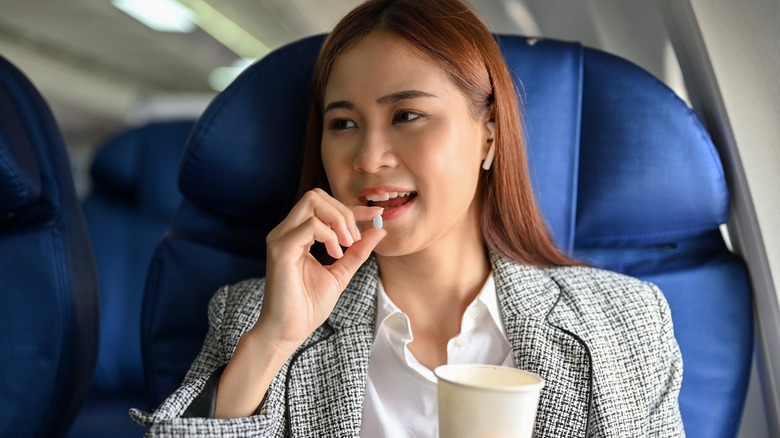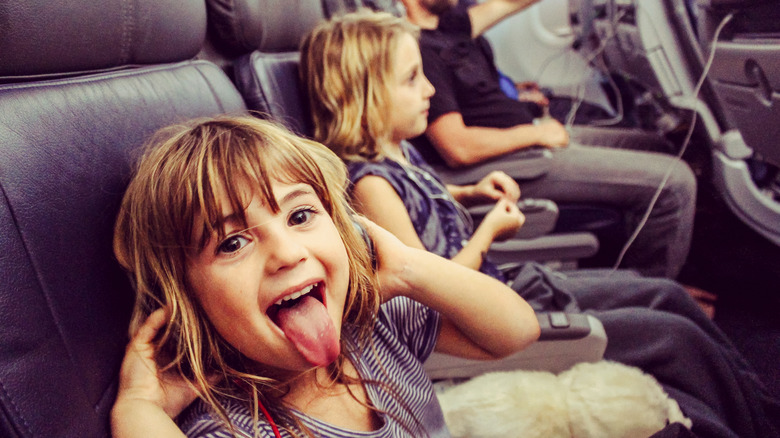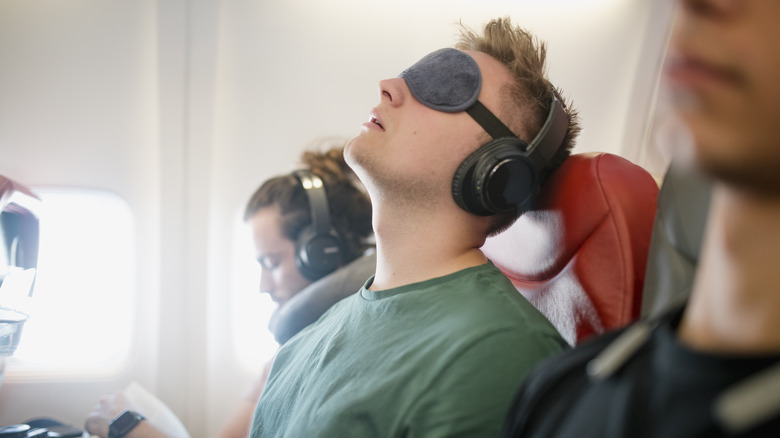The Unexpected Sleeping Aid You Should Think Twice Before Taking On A Flight
Planes aren't the ideal place to get some shut-eye, so you might consider tossing a sleeping aid into your bag to help you doze, one of the common tips for surviving a long-haul flight. However, even seemingly innocuous medicines can do more harm than good. Case in point: diphenhydramine, commonly known as Benadryl.
The over-the-counter allergy remedy isn't just for staving off a runny nose and itchy eyes. For many who take it, it triggers drowsiness, which is why diphenhydramine is also found in nighttime meds such as Advil PM. The active ingredient may not be as strong as a sleep aid prescribed by a doctor, but it can work in a pinch when you can't seem to wind down — such as on a noisy, uncomfortable plane.
With that said, you may want to rethink taking Benadryl during a long journey. First, it likely won't leave you feeling fresh and well-rested, thanks to its long-lasting sedative effects. "It makes us feel really groggy when we wake up, and it can make us feel really hungover," Dr. Aneesa Das, a sleep medicine specialist at Ohio State University, shared with Condé Nast Traveler. On top of that, diphenhydramine and other antihistamines can cause dry mouth and dry eyes, which can be unbearable when paired with dry cabin air. If your sinuses get too dry, you could also experience a sore throat, nosebleeds, or an infection.
Benadryl shouldn't be given to children on flights either
Benadryl isn't just used as a sleep aid for adults. Some parents use the over-the-counter medicine to help lull their children to sleep, often assuming that a few mild side effects are better than a fussy, sleep-deprived child. This can be an especially tempting option if you've given the medicine to your kid for allergies before and know they tolerate it well.
But as Dr. Kristi Redlich, a pediatrician with Northwestern Medicine Huntley Hospital, told Parents, "Benadryl is never recommended to be used as a sleep aid for children, and it is also never recommended for use on long trips (plane or car rides) to keep kids calm." One reason is similar to the effect on adults: It can cause drowsiness that lingers even after your flight. Combine that with an unfamiliar environment and other travel stressors, and your child may feel upset and irritable once you touch down at your destination.
In some cases, antihistamines can also have the opposite effect, making a child more hyperactive and excitable. Besides being difficult to manage on a plane, this can also wreck your child's sleep schedule and lead to an energy crash at an inopportune time. If you're still considering giving your little one Benadryl on a flight, be sure to consult with your pediatrician first.
What sleeping aids are safe to use?
Besides Benadryl, prescription sleep aids can also be risky, given their tendency to turn people into uninhibited zombies (ever heard the stories of the sleep-walking passengers or plane streakers?). So, what can you do when you need to catch some z's at 30,000 feet? Melatonin is one alternative, though, like Benadryl, it can cause grogginess if you're not careful.
"There are some people who will say, 'I just can't handle melatonin because I feel too foggy and I have some concentration difficulties,'" Mayo Clinic Sleep Specialist Dr. Lois Krahn explained to CNN. "If they awakened too early when the melatonin is still in their blood and in their brain, that's probably a very real experience." Test out the remedy before your trip to see how it makes you feel, and try to pop one early in your flight to give yourself more time to rest.
For children — and adults going medicine-free — it helps to book long flights during regular sleep times. Then, once the flight attendants turn down the cabin lights, you'll be more likely to drift off to sleep. If you have a daytime flight, limit exposure to light when possible. This could mean donning an eye mask (or trying this genius hack for sleeping without an eye mask) or, especially for children, replacing screens with books. And remember, sometimes the best sleep aids are the simplest: a blanket, a neck pillow, and noise-canceling headphones.


